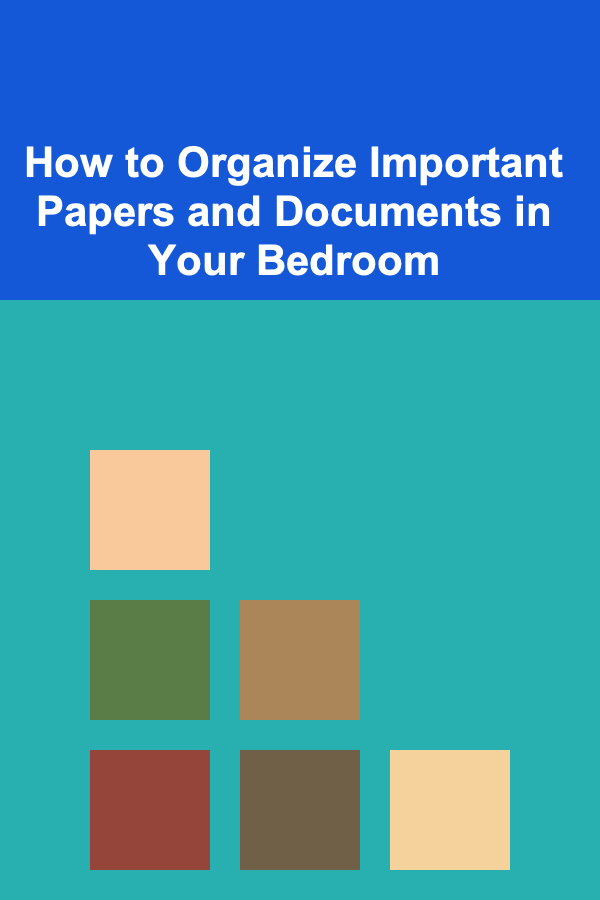
How to Organize Important Papers and Documents in Your Bedroom
ebook include PDF & Audio bundle (Micro Guide)
$12.99$7.99
Limited Time Offer! Order within the next:

In today's fast-paced world, managing important papers and documents can feel overwhelming. Whether it's bills, tax records, or sentimental items, keeping your documents organized is essential for maintaining peace of mind and ensuring you can access what you need when you need it. This article will provide a comprehensive guide on how to effectively organize important papers and documents in your bedroom, promoting clarity and reducing stress.
Understanding the Importance of Organization
Mental Clarity
An organized space fosters mental clarity. When your important papers are neatly stored and easily accessible, it reduces anxiety and promotes a sense of control. You're less likely to feel overwhelmed by clutter, allowing for better focus on important tasks.
Time Efficiency
When you need to find a document quickly---whether it's a bill due tomorrow or a school record for your child---having a well-organized system saves valuable time. Instead of digging through piles of paper, you can locate what you need in moments.
Protection of Important Information
Proper organization protects sensitive information from being lost or damaged. It also ensures that important deadlines are met, such as submitting tax forms or paying bills on time.
Assessing the Current Situation
Before diving into organizing your important papers, it's vital to assess your current situation.
Identifying Problem Areas
Walk through your bedroom and identify areas where papers tend to accumulate. Common problem spots include:
- Nightstands: Often become catch-alls for loose papers.
- Desks: Can quickly become cluttered with bills, documents, and miscellaneous items.
- Closets: Frequently house boxes containing unorganized paperwork.
Take note of these areas so you can address them strategically.
Categorizing Your Documents
Begin categorizing your documents into broad groups:
- Financial Documents: Bills, bank statements, tax returns.
- Health Records: Medical history, prescriptions, insurance.
- Legal Documents: Contracts, property deeds, birth certificates.
- Personal Items: Sentimental letters, children's artwork.
This initial categorization will guide your organizational strategy.
Choosing Storage Solutions
The next step is choosing the right storage solutions that suit your needs and preferences.
Filing Cabinets
Filing cabinets are classic storage solutions for organizing documents:
- Vertical Cabinets: Take up less floor space and fit nicely in corners.
- Lateral Cabinets: Provide wider drawers, making it easier to see files at a glance.
When selecting a filing cabinet, consider size, style, and functionality.
Binders
For smaller collections of documents, binders work well:
- Three-Ring Binders: Allow for easy addition and removal of pages.
- Dividers: Use dividers within binders to categorize documents further.
Binders are particularly useful for organizing things like:
- School records
- Important manuals
- Recipe collections
Digital Solutions
In today's digital age, converting paper documents to digital formats is increasingly popular:
- Scanning Documents: Use a scanner or scanning app to digitize important papers.
- Cloud Storage: Services like Google Drive or Dropbox allow you to store and access documents from anywhere.
Digital solutions help reduce physical clutter while ensuring crucial information is backed up.
Creating an Organizational System
Once you've selected your storage solutions, it's time to create an effective organizational system.
Labeling
Labeling is essential for easy identification:
- File Labels: Clearly label each file in your cabinet to indicate its contents.
- Binder Labels: Use a label maker or handwritten labels for binders.
Consider color-coding labels to make it visually appealing and easier to navigate.
Color-Coding
Color-coding can simplify the organization process:
- Different Colors for Different Categories: Assign colors to financial documents, health records, legal documents, etc.
This visual approach helps you quickly identify where to find specific items without having to read each label.
Alphabetical vs. Chronological Systems
Decide on how you want to arrange documents:
- Alphabetical: Useful for categories like contacts or vendors.
- Chronological: Effective for documents like bills or receipts, allowing you to track items over time.
Choose the method that best suits your needs and stick to it for consistency.
Regular Maintenance
To keep your paper organization system effective, regular maintenance is essential.
Daily Habits
Establish daily habits to prevent clutter from building up:
- Set Aside Time: Dedicate a few minutes each day to review new papers and decide what to keep, shred, or file.
- Tidy Up: At the end of each day, ensure all papers are put back in their designated places.
Monthly Reviews
Conduct monthly reviews of your documents:
- Purge Unnecessary Items: Go through your files and remove anything outdated or no longer needed.
- Update Files: Ensure all documents are current, especially for areas like finances and health records.
This routine keeps your system functioning smoothly and reduces the risk of accumulating clutter.
Protecting Sensitive Information
Keeping your sensitive information secure is paramount.
Shredding Unwanted Documents
Invest in a shredder to dispose of documents that contain personal information. Items to shred include:
- Old bank statements
- Expired credit cards
- Medical records
Shredding protects your identity and keeps private information out of the wrong hands.
Secure Storage Options
For highly sensitive documents, consider secure storage options:
- Fireproof Safe: Invest in a fireproof safe for critical documents like birth certificates, passports, and property deeds.
- Lockable Drawers: Utilize filing cabinets or storage containers with locks to secure sensitive materials.
These options provide peace of mind, knowing that your important information is protected.
Dealing with Emotional Attachments
Some documents carry emotional significance, making it challenging to decide what to keep.
Sentimental Items
Consider creating a designated space for sentimental items:
- Memory Box: Use a box to store letters, old photographs, or mementos that hold special meaning.
- Curated Keepsakes: Limit the number of items you keep to ensure they remain meaningful rather than overwhelming.
Remember that it's okay to let go of some items in favor of preserving the most cherished memories.
Making Tough Decisions
When faced with emotional attachments, ask yourself:
- Why am I keeping this?
- Does it bring me joy or serve a purpose?
Having clear criteria can help you make more objective decisions about which documents to retain.
Common Mistakes to Avoid
As you embark on your journey to organize important papers, be aware of common pitfalls:
Overcomplicating the System
Simplicity is key. Avoid creating overly complicated systems that may lead to confusion and frustration. Stick to straightforward labeling and categorization.
Neglecting Maintenance
Failure to maintain your system can lead to clutter buildup. Prioritize daily habits and monthly reviews to keep everything in check.
Holding onto Too Much
It's easy to fall into the trap of keeping unnecessary documents "just in case." Be mindful and selective about what you choose to retain.
Conclusion
Organizing important papers and documents in your bedroom is not just about tidiness; it's about creating a functional and peaceful environment that supports your daily life. By understanding the importance of organization, choosing appropriate storage solutions, establishing effective systems, and committing to regular maintenance, you can achieve a clutter-free haven.
Embrace the process and remember that small steps lead to significant changes. A well-organized space will not only enhance your productivity but also contribute to a sense of calm and clarity, allowing you to focus on what truly matters. Start today, and transform your bedroom into a sanctuary of order and efficiency!

Designing Adaptive Learning Experiences: Innovations and Applications in E-Learning
Read More
How to Calculate Potential Rental Income
Read More
How to Design a Retirement Planning Checklist for Evaluating Your Current Financial Situation
Read More
How to Plan a Fun Family Game Night
Read More
How to Save for a Home Down Payment in Less Time
Read More
How to Tackle a Whole-House Renovation Step by Step
Read MoreOther Products

Designing Adaptive Learning Experiences: Innovations and Applications in E-Learning
Read More
How to Calculate Potential Rental Income
Read More
How to Design a Retirement Planning Checklist for Evaluating Your Current Financial Situation
Read More
How to Plan a Fun Family Game Night
Read More
How to Save for a Home Down Payment in Less Time
Read More